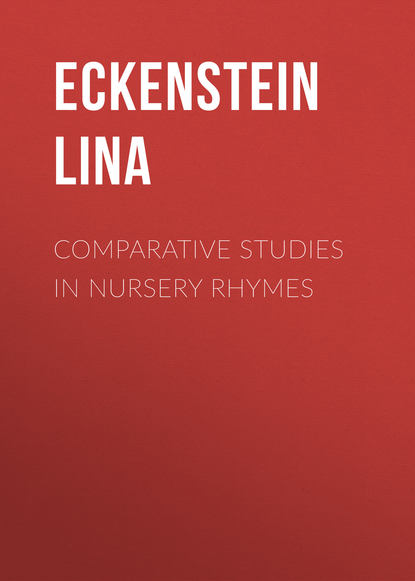По всем вопросам обращайтесь на: info@litportal.ru
(©) 2003-2024.
✖
Comparative Studies in Nursery Rhymes
Настройки чтения
Размер шрифта
Высота строк
Поля
In France the same game is known as Le Pied de Bœuf, "the foot of the ox," and a scramble of fists starts at the words: —
Neuf, je tiens mon pied de bœuf.
(Mo., p. 351.)
"Nine, I hold my ox's foot";
the number nine in this case being also mentioned.
The meting out of punishments by nines goes far back in history. It was associated with a Yule-tide sport which is still practised in Denmark and in Schleswig, and is known as Ballerrune or Balderrune. Every member of the assembled company repeated a formula on "Balder Rune and his wife," and he who made a mistake received nine blows, as in our game. The custom was explained by the legend that the god Balder, incensed at his wife's loquacity, chastised her by giving her nine blows, and ordered that this should be repeated every year, so that women be reminded that it is their duty to be silent when their husbands speak (H., p. 44).
In the game of Dump also, it is the person who speaks first that is punished, but there is nothing to suggest that this was a woman, for the game is essentially a boys' game.
The story of The Woman and her Pig (or Kid), like that of Jack, is told over a wide geographical area. In the Scottish version the woman lived in a wee house and found two pennies and bought a kid. On coming home she saw a bush and wished to pull off its berries, and could not. She set the kid to watch the house, and went to seek the help of dog, stick, fire, water, ox, axe, smith, rope, mouse, cat, milk, in her hope of breaking the spell that had fallen on the bush. Each animal or object refused "to do the next one harm, saying that it never did it any harm itself"; but the cat finally could not resist the temptation of lapping the milk (1870, p. 57). Thus the tale introduced a moral element which is not found elsewhere.
In Sweden the tale of The Old Woman and her Pig is called Konen och Grisen Fick, "the woman and her pig Fick," and the pig refused to leave off eating acorns. A similar tale is called Gossen och Geten Näppa, "the lad and the kid Näppa," (1849, p. 6). In Elsass the pig is called Schnirrchele (St., p. 93), in Transylvania it is Mischka or Bitschki (Sch., p. 372). And a version from the north of France tells how Biquette got into a cabbage-patch from which stick, fire, water, were summoned to expel her. Biquette is described as a kid (D., p. 122). In Languedoc Biquette reappears as Bouquaire-Bouquil, who is furnished with horns and does havoc in a millet-field from which he is expelled with the help of wolf, dog, stick, fire, water, ox, rope (M. L., p. 538). In all cases the animal is one that is provided with horns. Millet is one of the oldest cereals that were cultivated in Europe, the displacement of which by the cultivation of corn had begun in England when Pytheas visited these shores in the fourth century B.C. Can the "malt" of This is the House that Jack built stand for millet?
A French piece is current in Remiremont which is called Le Conjurateur et le Loup, "the magician and the wolf." It describes the contest between them, and shows that the making and unmaking of spells is involved: —
L'y a un loup dedans le bois,
Le loup ne veut pas sortir du bois.
Ha, j' te promets, compèr' Brocard,
Tu sortiras de ce lieu-là.
(R., p. 152.)
"There is a wolf in the wood, the wolf will not come out of the wood. Ha, I promise you, brother Brocard, you will soon come out."
And the magician summons to his assistance stick, fire, water, calf, butcher, devil, which help him to expel the wolf.
Even more primitive than this tale is one current in Languedoc, in which a spell has fallen on a root or turnip, which is finally raised by the hog. It begins: "The old woman went into the garden in order to pull out a turnip. When the old man saw that the old woman did not come back, he went into the garden and saw the old woman pulling at the turnip. The old man pulled at the old woman, the old woman pulled at the turnip, but the turnip stuck fast." They were followed by daughter-in-law, son, man, maid, and so forth, including the cat and the rat. Finally the hog came to the rescue. Instead of pulling like the others, he attacked the turnip from below, and by doing so he succeeded in raising it, otherwise the spell would continue, "and the root would still be holding fast" (M. L., p. 541).
The comparison of these various tales or pieces shows that dog, stick, fire, water, ox, butcher, form a sequence of powers that was accepted over a wide geographical area. They were invoked wherever it was question of breaking a spell that had fallen on a coveted object, the object including pigs, pears, oats, berries, millet, and roots. These are products that were prized in Europe from a remote period in antiquity. As the products are primitive, so probably is the form of verse in which the story is told of their being made fast. For the same form of verse is used in a further class of pieces to which we now turn, and which, by their contents, betray a pre-Christian origin.
CHAPTER XII
CHANTS OF NUMBERS
AMONG our traditional games, some consist of a dialogue in which the answer is set in cumulative form. These include the game known as The Twelve Days of Christmas, which was played on Twelfth-Day night by the assembled company before eating mince-pies and twelfth cake. In the game of Twelve Days each player in succession repeated the gifts of the day, and raised his fingers and hand according to the number which he named. Each answer included the one that had gone before, and forfeits were paid for each mistake that was made. (1894, II, 315.)
The oldest printed version of the words used in playing Twelve Days stands in one of the diminutive toy-books exhibited at South Kensington Museum by E. Pearson. These words begin: —
The first day of Christmas, my true love gave me
A partridge in a pear-tree.
The second day of Christmas, my true love gave me
Two turtle-doves and a partridge in a pear-tree.
And so forth, enumerating three French hens, four colly birds, five gold rings, six geese a-laying, seven swans a-swimming, eight maids a-milking, nine drummers drumming, ten pipers piping, eleven ladies dancing, twelve lords leaping.
The same game is played in Scotland, where it is known as The Yule Days, but is carried on to thirteen.
The king sent his lady on the first Yule day
A papingo-aye [i.e. peacock or parrot]
Who learns my carol and carries it away?
The king sent his lady on the second Yule day
Two partridges and a papingo-aye.
(1870, p. 42.)
On the third day he sent three plovers; on the fourth, a goose that was grey; on the fifth, three starlings; on the sixth, three goldspinks; on the seventh, a bull that was brown; on the eighth, three ducks a-merry laying; on the ninth, three swans a-merry swimming; on the tenth, an Arabian baboon; on the eleventh, three hinds a-merry dancing; on the twelfth, two maids a-merry dancing; on the thirteenth three stalks of corn.
In Cambresis, in the North of France, the same game is called Les dons de l'an, "the gifts of the year," but the gifts correspond in number with the number of the day. They are: one partridge, two turtle-doves, three wood-pigeons, four ducks flying, five rabbits trotting, six hares a-field, seven hounds running, eight shorn sheep, nine horned oxen, ten good turkeys, eleven good hams, twelve small cheeses (D. B., II, 125).
In the West of France the piece is described as a song. It is called La foi de la loi, that is, "the creed of authority," and is sung avec solennité. It begins: —
La premièr' parti' d'la foi de la loi,
Dit' la moi, frère Grégoire.
– Un bon farci sans os —
La deuxième parti' d'la foi de la loi,
Dit' le moi, frère Grégoire
– Deux ventres de veau,
Un bon farci sans os.
(B., II, 271.)
"The first part of the creed of authority, tell it me, Brother Gregory. A good stuffing without bones. The second part of the creed of authority … two breasts of veal."
And so forth, enumerating three joints of beef, four pig's trotters, five legs of mutton, six partridges with cabbage, seven spitted rabbits, eight plates of salad, nine plates of (? chapitre), ten full casks, eleven beautiful full-breasted maidens, twelve knights with their rapiers.
The same conceptions underlie a Languedoc chant, in which the numbers are, however, carried on to fifteen. The gifts in this case are made on the first fifteen days of the month of May: —
Le prumiè del més de mai,
Qu'embouiarei à mai mio.
Uno perdic que bolo, que bolo.
(M. L., p. 486.)
"The first of the month of May, what shall I send to my lady love? – A partridge that flies and flies."
And similarly we read of two doves, three white pigeons, four ducks flying in the air, five rabbits, six hares, seven hunting dogs, eight white horses, nine horned oxen, ten bleating sheep, eleven soldiers coming from war, twelve maidens, thirteen white nosegays, fourteen white loaves, fifteen casks of wine.
The contents of these chants at first sound like nonsense, but on looking at them more closely one notes that the gifts which they enumerate mostly consist of birds and beasts that are conceived as food. We know that the weather on Twelve Days was carefully observed, since the weather of the months of the ensuing year was prognosticated from that of the corresponding day of the twelve.[54 - Frazer, loc. cit., 1900, p. 143; Rolland, Almanach des traditions populaires, 1883, Jan. 1-12.] A like conception perhaps underlies these enumerations of food, which may refer to the representative sports of the months.
The game of Twelve Days in a degraded form is known as The Gaping Wide-mouthed Waddling Frog, in which the crux likewise consists of answering the question with rapidity and exactness. But words are purposely chosen that are difficult to enunciate and to remember. The result is a string of nonsense. The words used in playing The Gaping Wide-mouthed Waddling Frog were first printed in a toy-book of the eighteenth century. Persons who are still living remember it in this form as a Christmas game. As in playing Twelve Days, the players sat in a circle, a dialogue ensued, and the answers were given in cumulative form. He who made a mistake gave a forfeit.
Buy this of me: – What is it?
The gaping wide-mouthed waddling frog.
Buy this of me: – What is it?
Two pudding ends will choke a dog,
With a gaping wide-mouthed waddling frog.






